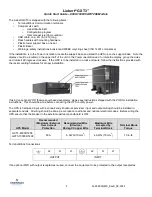
3
SL-23185QS10_Rev0_09-2012
The Liebert
®
GXT3
™
UPS is ready to be powered.
1. Ensure the maintenance bypass breaker is in the open position and that the guard is secured in place.
2. Ensure that the REPO connector on the rear of the unit has a jumper between pins 1-2 of the REPO connector or
properly wired to an Emergency Power Off circuit (normally closed).
3. Install any optional Intellislot communication card into the Intellislot port on the rear of the unit.
4. Ensure the Power Module locking lever is in the locked position.
Note: this lever is located on the front of the unit
just to the left of the display (rack orientation) or below the display (tower orientation)
5. Close the input breaker in the panelboard that provides input power to the UPS
6. Close the input breaker on the rear of the UPS unit. Note: the UPS will now have power and the AC Input
indicator on the display should illuminate. The UPS will also begin to charge the internal batteries at this point, so
there will also be battery capacity LEDs illuminated.
7. The Liebert GXT3 UPS has customizable settings that might be required depending on the application. Please
review the CD that ships with the UPS unit for the steps to use the configuration program and make any
necessary changes. Once that is complete, proceed to the next step.
8. Close all output breakers on the rear of the UPS and on the POD (if used) or in an external panelboard (if used)
9. If external battery cabinets are used, close all breakers on the rear of each battery cabinet
10.
Press and hold for about 4 seconds, the “ON” button on the UPS display.
Note: this will apply power to the output
receptacles via the internal bypass and the bypass indicator will be illuminated along with an audible beep
.
11. Over the next several seconds the UPS will perform the self checks and startup routine then automatically
transfer the connected equipment to the inverter power. Once that is complete, the bypass indicator will turn off
and the inverter indicator will illuminate.
The UPS is now running in normal operation mode providing protected, filtered power to the connected equipment.






















